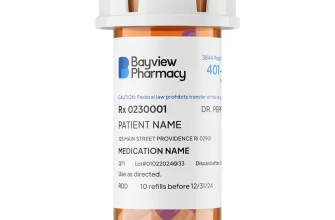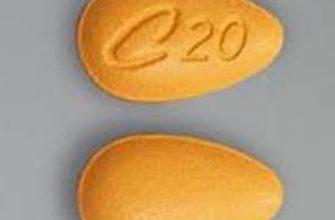Consider a Cialis 20mg trial if erectile dysfunction impacts your quality of life. This dosage is a popular starting point for many men, offering a balance between efficacy and potential side effects. Remember to consult your doctor before starting any medication.
Many find a trial period invaluable for assessing personal tolerability and effectiveness. This allows you to experience firsthand how Cialis 20mg affects you and to discuss any concerns directly with your physician. A frank discussion with your doctor is crucial to determine if this medication is the right choice for you.
During the trial, pay close attention to any side effects. Common ones include headaches, muscle aches, and nasal congestion. If you experience severe side effects, stop taking the medication and contact your doctor immediately. Proper medical guidance ensures you safely manage the trial process.
Remember: A Cialis 20mg trial is a personalized experience. What works for one person might not work for another. Open communication with your doctor ensures you receive tailored advice and support throughout this process. Your health is a priority.
- Cialis 20mg Trial: A Comprehensive Guide
- Understanding the Trial Process
- Potential Side Effects and Precautions
- Finding a Doctor and Obtaining a Prescription
- Important Considerations After the Trial
- Understanding Cialis 20mg and its Intended Use
- Treating Erectile Dysfunction
- Managing Benign Prostatic Hyperplasia (BPH)
- Finding Legitimate Cialis 20mg Trial Programs
- What to Expect During a Cialis 20mg Trial
- Potential Side Effects and Precautions
- Interactions with Other Medications and Substances
- Specific Interactions to Note
- Evaluating the Effectiveness and Deciding on a Treatment Plan
Cialis 20mg Trial: A Comprehensive Guide
Seek professional medical advice before starting any trial, including a Cialis 20mg trial. Your doctor will assess your health and determine if Cialis is suitable for you.
Understanding the Trial Process
Trials usually involve obtaining a prescription from a doctor after a consultation. Expect questions about your medical history, current medications, and the reason for seeking Cialis. The doctor will explain potential side effects and answer your questions. The trial period might vary, depending on your doctor’s recommendation.
- Dosage: Your doctor will prescribe the appropriate dosage, which might start with a lower dose than 20mg.
- Duration: Trials usually last for a specific period, allowing you to assess the medication’s effectiveness.
- Monitoring: Regular follow-up appointments with your doctor are necessary to monitor your progress and adjust the dosage if needed.
Potential Side Effects and Precautions
Common side effects include headaches, flushing, nasal congestion, and indigestion. More serious, though rare, side effects include vision changes, hearing loss, and prolonged erection. Immediately contact your doctor if you experience any concerning symptoms.
- Conditions to disclose: Inform your doctor of any heart conditions, liver or kidney problems, or if you take nitrates.
- Drug interactions: Cialis can interact with other medications. Provide your doctor with a complete list of your current medications and supplements.
- Alcohol consumption: Limit alcohol intake while on Cialis, as it can increase the risk of side effects.
Finding a Doctor and Obtaining a Prescription
You can find doctors who prescribe Cialis through online telehealth platforms or by searching for urologists or general practitioners in your area. Be sure to research the doctor’s qualifications and experience before scheduling an appointment.
Important Considerations After the Trial
After the trial, discuss your experience with your doctor. They will help you determine if Cialis is the right long-term solution for you, or if alternative treatments should be considered. Remember, this is a collaborative process and open communication with your healthcare provider is key.
Understanding Cialis 20mg and its Intended Use
Cialis 20mg is a prescription medication used to treat erectile dysfunction (ED) and symptoms of benign prostatic hyperplasia (BPH). It works by increasing blood flow to the penis, aiding in achieving and maintaining an erection. For ED, it’s taken as needed, usually 30 minutes to 2 hours before sexual activity. The effect can last up to 36 hours.
Treating Erectile Dysfunction
For men with ED, Cialis 20mg helps improve the ability to get and keep an erection firm enough for satisfactory sexual intercourse. Dosage may be adjusted by a doctor based on individual response and health conditions. It’s crucial to follow your doctor’s instructions precisely.
Managing Benign Prostatic Hyperplasia (BPH)
Cialis 20mg can also alleviate symptoms of BPH, such as difficulty urinating and frequent nighttime urination. In this case, it’s typically taken daily at a lower dosage determined by your physician. This daily use helps maintain consistent improvement in urinary function.
Remember: Always consult your doctor before starting any new medication, including Cialis 20mg. They will assess your health and determine the appropriate dosage and treatment plan for your specific needs. Do not exceed the prescribed dosage. Discuss potential side effects and interactions with other medications with your doctor.
Finding Legitimate Cialis 20mg Trial Programs
Start by checking your insurance coverage. Many insurance plans cover Cialis, potentially reducing the cost of a trial or full prescription. Confirm coverage details with your provider directly.
Next, consult your doctor. They can assess your suitability for Cialis and provide a prescription, often including a trial period as part of the treatment plan. Discuss potential side effects and drug interactions openly.
If your doctor approves a trial, consider manufacturer coupons or patient assistance programs. These programs often offer financial aid for prescription medications. Check the manufacturer’s website for details.
Beware of online pharmacies offering Cialis trials without a prescription. These may sell counterfeit drugs or unsafe medications. Prioritize your health; obtain prescriptions only through licensed medical professionals.
Finally, review your options carefully before committing to a trial or purchasing Cialis. Understand the potential benefits and risks involved. If cost is a concern, discuss various payment plans with your pharmacist.
| Option | Pros | Cons |
|---|---|---|
| Doctor’s Prescription | Safe, legitimate, personalized advice | Requires a visit, may not offer a trial |
| Manufacturer Coupons | Reduced cost | Availability varies, specific requirements may apply |
| Patient Assistance Programs | Financial aid for qualified individuals | Eligibility criteria, application process required |
What to Expect During a Cialis 20mg Trial
Begin by taking the tablet with a glass of water, ideally at least one hour before anticipated sexual activity. Avoid taking it with high-fat meals, as this can delay absorption.
You should notice effects within 30 minutes to 2 hours, although onset can vary between individuals. The duration of action is typically up to 36 hours.
- Expect increased blood flow to the penis, leading to improved erectile function. The intensity of this effect can depend on individual factors.
- Some men experience mild side effects, such as headache, flushing, or nasal congestion. These are usually temporary and mild.
- Do not combine Cialis with other erectile dysfunction medications. Consult your physician about potential drug interactions.
It’s important to remember that Cialis aids in achieving an erection; sexual stimulation is still necessary. The medication doesn’t create spontaneous erections.
- Keep a record of your experiences. Note the time of ingestion, onset of effects, and any side effects encountered. This information aids in discussions with your doctor.
- If you experience any severe side effects, like prolonged erection (priapism) or sudden vision changes, seek immediate medical attention.
- During the trial period, honestly assess your results. Discuss your experiences, both positive and negative, with your healthcare provider to determine the best treatment plan for your needs.
Consult your doctor before starting a Cialis trial, or any medication. They can address your specific health conditions and potential contraindications. This information is for guidance only, and not a replacement for professional medical advice.
Potential Side Effects and Precautions
Consult your doctor before starting Cialis 20mg. This medication can cause side effects, some common, some rare. Common side effects include headache, flushing, nasal congestion, and indigestion. These usually are mild and temporary.
More serious, though less frequent, side effects include vision changes (blurred vision, changes in color perception), hearing loss, and prolonged erection (priapism). Seek immediate medical attention if you experience these.
Heart problems are a serious concern. Cialis can lower blood pressure, potentially causing dizziness or fainting. Avoid Cialis if you have a history of heart disease, stroke, or uncontrolled high blood pressure. Inform your doctor of any heart conditions.
Men with liver or kidney disease should discuss Cialis use with their physician, as dosage adjustments may be necessary.
Interaction with other medications is possible. Cialis can interact negatively with nitrates (used to treat chest pain) and certain other medications. Be transparent with your doctor about all medications and supplements you take.
Alcohol consumption can intensify side effects. Moderate your alcohol intake while taking Cialis.
Dosage should be followed precisely. Do not exceed the recommended dose. Your doctor will determine the appropriate dosage based on your individual needs.
This information is not exhaustive and should not substitute professional medical advice. Always consult your doctor or pharmacist for complete information and personalized guidance.
Interactions with Other Medications and Substances
Always inform your doctor about all medications you are taking, including over-the-counter drugs, herbal supplements, and recreational drugs. Cialis can interact negatively with nitrates, commonly found in medications for chest pain (angina). This combination can cause a dangerous drop in blood pressure. Avoid grapefruit juice; it can increase Cialis levels in your blood, potentially leading to side effects. Similarly, certain antifungals like ketoconazole and itraconazole can boost Cialis’s concentration, necessitating a lower Cialis dose.
Specific Interactions to Note
Alpha-blockers, used to treat high blood pressure or enlarged prostate, can also interact with Cialis, increasing the risk of low blood pressure. If you take alpha-blockers, discuss the risks with your doctor before starting Cialis. Ritonavir and indinavir, protease inhibitors used to treat HIV, can significantly increase Cialis levels. Your doctor may need to adjust your Cialis dose accordingly. Similarly, medications that affect liver enzymes, like rifampicin, may impact Cialis metabolism, potentially requiring dose adjustments.
Evaluating the Effectiveness and Deciding on a Treatment Plan
Monitor your responses carefully during the trial period. Note improvements in erectile function, ease of achieving an erection, and the duration of the effect. Maintain a journal to record your experiences consistently.
Consider the side effects. Headaches, flushing, and nasal congestion are common. If side effects are severe or persistent, discuss them with your doctor immediately. They may adjust your dosage or suggest an alternative.
Compare your experience with Cialis 20mg to previous treatments, if any. Document which aspects are better or worse, including ease of use and overall satisfaction.
Consult your doctor to discuss your findings. They will help you assess whether Cialis is the right treatment for you, considering your medical history and personal preferences. Together, you can formulate a personalized treatment plan.
Explore alternative treatment options if Cialis is ineffective or causes unacceptable side effects. Your physician can discuss other medications, therapies, or lifestyle changes to improve erectile function.
Remember, open communication with your doctor is key to finding the best treatment for your specific needs.










